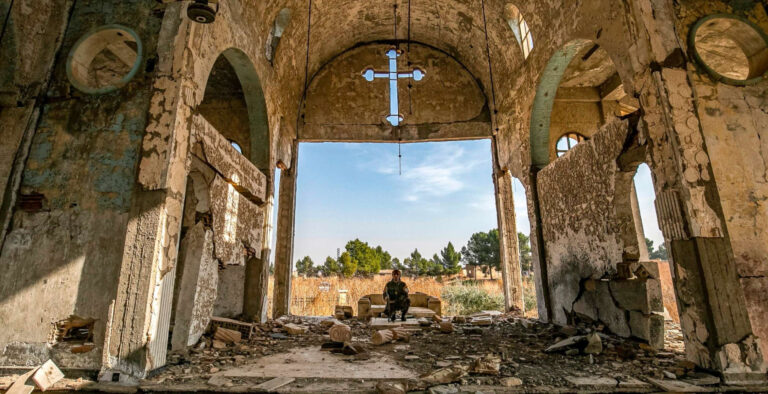Christians in Iraq are united by a red thread, red as in spilled blood, that links various events that have occurred in the country over the past 20 years.
During that period, which began with the US invasion in 2003 and saw a jihadi attack against a Syriac Catholic church in Baghdad and mass loss of life in a fire that broke out at a wedding party in Qaraqosh, the community has paid a hefty price with martyrs’ deaths, an exodus, a never-ending fight to survive, and a still uncertain future.
This is much what the Chaldean Patriarch, Card Louis Raphael Sako, had to say during the meeting we recently had with him in Rome during the just-concluded Synod.
“There are no guarantees for real security and a stable future,” he lamented. “The picture is always one of extreme fragility, but Christians cannot live in a climate of persistent insecurity and precariousness”, while their blood continues to flow unpunished in attacks, accidents and ethnoreligious persecution.
Today, 31 October, marks the 13th anniversary of the attack against the Syriac Catholic Cathedral of Our Lady of Salvation (Sayedat al-Najat) in Karrada, a Baghdad neighbourhood, by a group of al-Qaeda terrorists.
On 31 October 2010, armed men stormed the church during Sunday Mass, taking worshippers hostage. When security forces tried to storm the building, the jihadis opened fire and killed en masse.
When it was all over, some 58 people lay dead, including the two priests who were celebrating the service at the time of the attack (Fr Thair and Fr Waseem), and at least another 75 people were wounded. For Iraqi Christians, it was the “bloodiest” attack since the end of World War II.
The long trail of violence and terror has struck down priests, bishops, and believers. But after the tragedy of the Islamic State and the international campaign that saw its defeat (at least militarily), some hope did emerge that the community might experience a renaissance.
Indeed, Pope Francis’s visit in 2021 did provide some relief amid the persistent sense of fragility and precariousness, but the incident at the Christian wedding reception in Qaraqosh in late September added another tragic chapter to the community’s sad history. Still shrouded in mystery, the fire that broke out caused the death of at least 126 people with hundreds injured.
For Card Sako, Christians are looking for “a future for their children” without violence and insecurity. “They need a place where they can study, go to school and university, find a job” but in Iraq this is not yet possible “because everything is sectarian: Sunnis, Shias, and Kurds reserve [positions and power] for members of their community” while Christians end up excluded.
“Even the self-styled Babylon Brigades persecute Christians, instead of defending them. This is still happening today in the Nineveh Plain.”
The group is behind attacks against the patriarch, successfully lobbying the Iraqi president to stop officially recognising the patriarch’s role, to which Card Sako responded by making the unprecedented move of transferring the patriarchal see from Baghdad to Erbil.
The fire at the wedding “was a shock for everyone, even Muslims,” the primate said, especially since “conditions of relative calm, of peace” prevail where it happened. “Locals came from surrounding villages and are close to each other. About a thousand people were inside the hall when the accident occurred and, in a few minutes, everything caught fire.”
Some sources claim that “the owner of the place is apparently linked to the [Babylon] Brigades, but noting is certain in this regard,’ the cardinal noted.
What is certain, is that someone “wants to intimidate Christians in order to drive them out of the area, to force them to leave Iraq, and make sure that others occupy it, that property, land and houses are stolen. This incident is designed to chase people out.”
Contrary to a sectarian mindset, the patriarch opts for a sense of belonging to Iraq and Christian identity. “I have never thought of myself as the leader of the Chaldeans; instead, I represent everyone, including Muslims. We have helped many of them in recent years.”
The Brigades instead are “only trying to divide Christians and have even bought some bishops with money” for favours and “this has created a huge scandal, as well as made them lose credibility. People say the Church is with this militia, but it’s just propaganda and lies.”
Confronted with a level of violence that far too often resembles martyrdom, Card Sako decided to respond firmly, and consistently.
“I will return to Baghdad only when the cancellation of the decree is withdrawn. Our Church has given a lot to Iraq, from the pope’s visit to humanitarian aid to Muslims at the time of the Islamic State, even more than to Christians. Today, the government thanks us by punishing the patriarch and an entire community.”
Source: Aina.org


